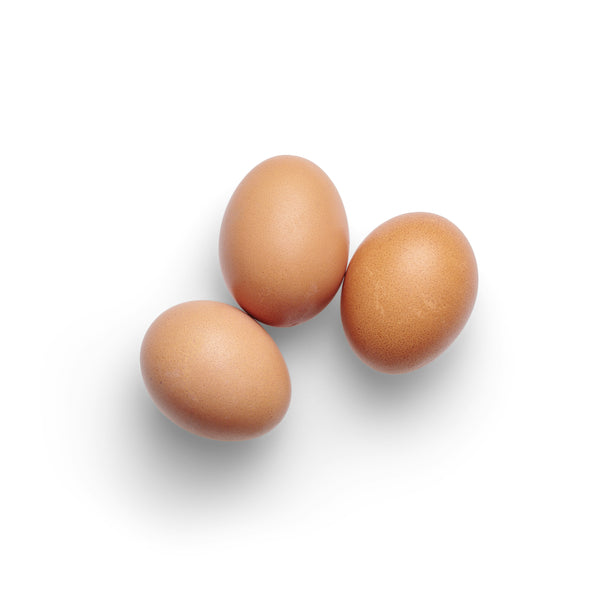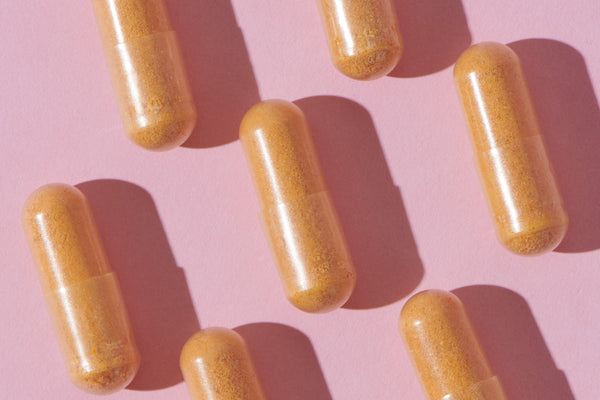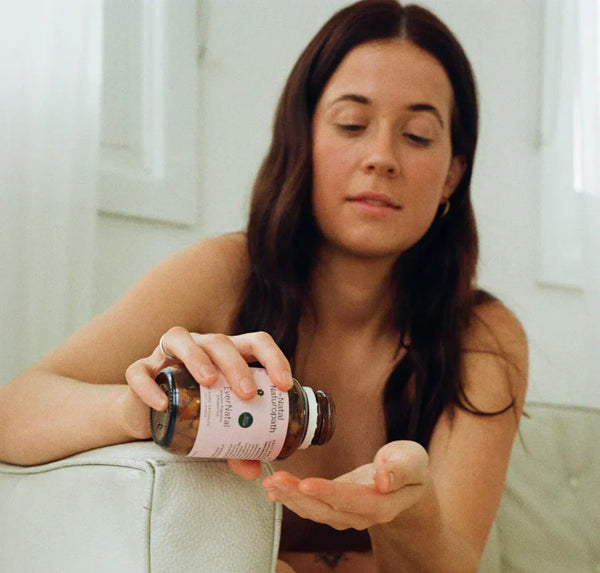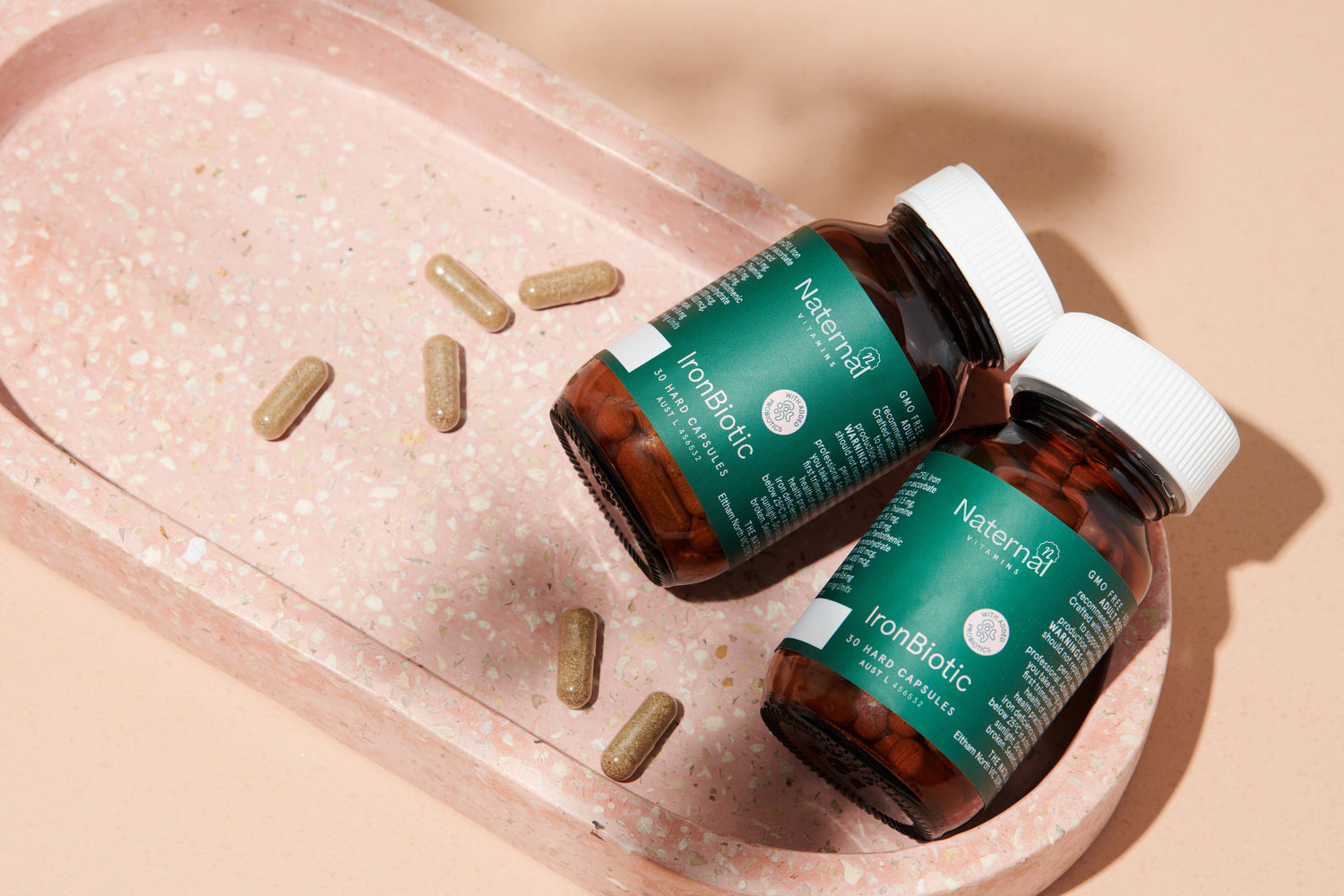Jump to:
There are four different types of PCOS, with different characteristics and symptoms, and different treatment approaches. I go through each one - Insulin Resistant PCOS, Post Pill PCOS, Adrenal PCOS and Inflammatory PCOS - and as a naturopath, how I treat them.
Mentioned:
- the testing you need to diagnose the different types of PCOS
- causes and symptoms of each type of PCOS
- what your hormonal blood tests are telling you
Interested in our upcoming PCOS webinar? Join me here. This webinar is for women like you who want to treat their PCOS naturally. During this webinar, you will learn about the lifestyle changes, nutritional supplements, and natural remedies that can help you manage your PCOS symptoms.
Here's what you can expect to learn during the webinar:
- The underlying causes of PCOS and how to address them with lifestyle, diet, nutritional and herbal supplementation.
- Blood tests to get and optimal levels
- The role of nutrition in managing PCOS and the best foods to eat and avoid
- The benefits of specific supplements for PCOS and what the research says
- How to track your menstrual cycle and identify ovulation to increase your chances of falling pregnant naturally
And much more!
TRANSCRIPT
Melanie (00:01.314)
Hello and welcome to episode 19 of the podcast. I'm your host Melanie. And today we are gonna be talking all about PCOS. So before I get onto that, today I was diagnosed with Dekwervanes, which is a thumb, wrist, hand kind of issue. So I posted on my Instagram stories a few weeks ago.
Has anyone experienced this pain before? And I circled the spot that was really hurting. It's like, without being able to visually show you, it's, imagine your thumb, it's right where the thumb meets your wrist there. It feels like a stabbing pain. Anytime my thumb is pulled back, so if I go to grab anything heavy, stabbing pain. If I go to pick up the twins, agony.
because you know when you pick up kids you're putting your hands under their armpits and there's a lot of pressure on that you know on that area between your thumb and your fingers. So it started happening it was really painful and I thought I must have injured myself so I'll just kind of alter my hand movements so I'm not using my left hand belly at all I'm not using my thumb at all I'm kind of just trying to alter what I do.
especially picking up the twins, now I'm putting my whole arm under their armpit rather than my hand, if that makes sense. So my right hand picks them up with one arm under the armpit and then under the other armpit, I'm using like the armpits resting on my forearm instead of picking them up with my fingers. Anyway, so that's been fine. When I posted on my stories, people were like,
Melanie (01:49.066)
It sounds like to quervains you really should get onto it because it'll only get worse. A few people like, oh, I've had the same thing. It's called mother's wrist. It'll go in time. There was a handful of people that said they needed cortisone injections, which I really don't want mainly because I have a needle phobia. Um, so I was a bit worried, right? So I then wondered, who do you go see for this? Because I had no idea.
Melanie (02:17.550)
I was like, do I see my Cairo? What sort of person am I like? Who is it an osteo and Kelly Eason from milk parenting. I think her business is called. She's an IB CLC lactation consultant. She messaged me and said, I recommend you go to a clinic in Bundoro called hand, hand in hand or hand to hand. Now I am forgetting it.
Melanie (02:48.106)
Um, I'm going to search my phone actually now so that I get the right one. Hang on. Okay. So it is hand in hand rehab, the hand therapists. So occupational therapists and physiotherapists that specialize in hands and they're in Bandura, Victoria. And so I was like, great, a hand therapist. That is literally who I need. I didn't know they existed. So I had my first appointment with her.
Melanie (03:16.182)
today and it was so great. Her name was Kristen was the therapist. She's a physio. She diagnosed it with Dekuervane's tenocynavitis. Anyway, so she's given me like a treatment plan. So I've got a massage, certain ligaments up near my elbow because they are linked to the ligaments in your thumb. So I've got to do some massage. I've got some stretches. I've got to apply heat and I've got a thumb brace to rest my thumb.
And then hopefully once the acute inflammation wears off, then I can start to re-strengthen the area. So yeah, it's a bit of a side note. If anyone is suffering the same thing, a hand therapist is who you need. And my health insurance covered 50% of it. So that was fantastic. Okay, now that's out of the way. Now I am gonna be speaking about PCOS today. So PCOS.
Melanie (04:13.934)
is a very, very, very common condition. So common. It would be one of the top conditions we see in the clinic. Like, I can't tell you how many clients have PCOS. First of all, I'm gonna run through the diagnosis of PCOS. So we've got polycystic ovaries, which is not PCOS, that's P-C-O. And then we have polycystic ovarian syndrome, which is different.
And I do find women come to me and go, I've got PCOS and I go, okay, can you show me your blood test results and your pelvic ultrasound? No, Melanie, I just had a pelvic ultrasound. So I say to them, well, you don't have PCOS then because the guidelines are in Australia. You have to have had an ultrasound to check your ovaries, to confirm that you're their cystic. So that means 20 plus follicles slash cysts do the same thing.
Melanie (05:13.210)
on both on each ovary. So 2001, 20 on another or more is the classification for PCO polycystic ovaries. But that doesn't mean you have the syndrome. The syndrome is another aspect. And this is where we see changes on someone's blood test. So hence why I say you can't be diagnosed with PCOS without a blood test. And that's the standard guideline in Australia. So you need both on a blood test. What we're looking for
Melanie (05:42.534)
is a few different hormones, okay? So we want to always see your fasting insulin, fasting, fasting insulin. We need to see your testosterone, your SHBG, your sex hormone binding globulin. We also need to see DHEA, which is the precursor to testosterone and estrogen made by your adrenal glands. That's another hormone that can be out with PCOS.
We also want to see your luteinizing hormone, which is LH and your FSH, follicle stimulating hormone. And that in addition to an ultrasound can tell any good practitioner what's going on and what type of PCOS you have, which is what I'm going through today because there are different types. And obviously
each have their own treatment plan and protocol. And if, for example, you have insulin resistant PCOS, you need to be treating it in such a different way. Mainly with, with dietary intervention, that's really going to help your insulin resistant PCOS that's going to be really different to the way I would treat post pill PCOS. Okay. So.
If you want to actually treat your PCOS, you first need to determine which one you've got that this podcast episode will help you do, but of course, always know we are here to help you one to one in an appointment. So if you've had your results and you want a practitioner to guide you through what's going on for you, what do we need to work on and what's the treatment plan? You can book an appointment with either myself, Alexis or Bella.
We all treat PCOS. Okay. So you can find us at www.thenadelnaturpath.com.au forward slash book dash now hyphen book hyphen now. Okay. Onto it now. The most common sort of PCOS is insulin resistant PCOS. So insulin resistant PCOS is basically where there are high levels of insulin, the normal in the body. Hence why we need your fasting insulin tested.
So your fasting insulin levels need to be less than 10 M-I-U slash L, milli-international units per liter. So it needs to be less than 10. If it's above 10, this is insulin resistance. And this is when our cells are becoming a bit numb to the effects of insulin.
meaning it's not actually creating the result in the cells that it needs, which causes the pancreas to then pump out more and more insulin until the cells start to get the message. Now I've seen insulin in the thirties before, which is like you're bordering on diabetic there. That's another thing to know if you have insulin resistant type, um, if you have insulin resistant PCOS, if it's unmanaged and it gets worse and your insulin creeps up as the years go on,
You'll eventually develop type two diabetes if your insulin does not get fixed and your glucose levels become out of control. That's type two diabetes. So it's something we really, really need to get on top of, not to mention having that level of insulin circulating can create you to struggle immensely with your weight. And especially around the stomach and abdomen region is where people are gaining their weight.
You could also have sugar cravings as well as symptoms like fatigue and brain fog. And then it's the high levels of insulin that push up your androgen levels. So your androgen levels mean your DHEA and testosterone. So when I say androgens, I mainly am talking about your testosterone, your DHEA. You can also get your androgen index checked on a blood test as well, which is not that necessary.
Melanie (09:52.346)
Actually, I've said that I'm fine to just see testosterone and DHEA. Now, so we've got high levels of insulin. This then drives up androgen levels, which then causes your symptoms like excessive hair growth on your face. So you might have a mustache or like facial hair, male pattern hair loss. So that thinning.
on top of your head. I don't know why I said male pattern, sorry. That's just the first thing I was thinking of. I mean, hair loss on your head and acne, especially jawline acne, neck acne, back acne and chest acne. If you have acne in one of those regions, you need to get your testosterone checked because like it's almost always high testosterone that gives you acne in those regions, especially the jaw.
Melanie (10:39.746)
So to rule this out, to find out if you've got insulin resistant PCOS, you must have your insulin tested. It must be fasting. And then to help manage insulin resistant PCOS, the key really is here to improve your insulin sensitivity and lower your insulin levels. If we can lower your insulin levels, this will stop driving up your androgen levels. This will stop the symptoms.
High androgens also means ovulation problems. So I'll go through that. Hence why we have irregular periods because your ovulation event is not occurring properly due to this huge level of testosterone. And also, even if you don't have this and you just have polycystic ovaries, you have so many.
cysts on those ovaries, one egg struggles to release immensely. It's like a fight to the which who's going to ovulate this month. It's a huge fight, a huge battle. This creates ovulation problems having too many cysts on your ovaries. So you need to treat that in itself. But again, that's a different treatment than if it was insulin resistant PCOS. But yeah, just polycystic ovaries is a problem in itself for many, many women. And they'll find they're ovulating way too late. I normally find what happens with
PCO is that they'll be ovulating between like day 16 to 21, which is way too late in your cycle to be ovulating. And their periods will come after day 30. That tends to be the thing, but the period still comes like it's still regular in that it still comes on the same day. They're about like day 35 day 32.
Melanie (12:23.682)
that's too long of a cycle and this can create fertility problems. So hence why we need to treat it. The next type of PCOS is, oh, sorry. I also wanted to go into a bit more detail actually about how the insulin is causing the problems with also in relation to luteinizing hormone. I didn't mention luteinizing hormone. So insulin increases ovarian androgen production. Like I mentioned, testosterone.
Melanie (12:50.930)
either by direct stimulation or by stimulating luteinizing hormone to go up. So we find high luteinizing hormone in PCOS. The reason why I'll go through now, both insulin and testosterone also can decrease its SHBG, which then increases the amount of testosterone that's biologically available, as well as a huge amount of free estradiol that's not bound up in that SHBG. This elevated level of estrogen also
can trigger a positive feedback response in luteinizing a hormone, meaning it's pushing up the production and there's a disordered level of luteinizing hormone and a negative feedback response to FSH. So a blood test will show high LH and low FSH when they are supposed to be a very, very similar number. They're supposed to be a one-to-one ratio. So if your LH is four, your FSH should be about four. But what we'll find in this situation
Melanie (13:49.810)
is LH will be like eight or nine and FSH will be like two, three, four. So this is like a two to one ratio. Um, then because of this exact hormonal pattern, follicles are stimulated and stimulated and stimulated. So we've got follicles growing, growing, growing. This is this. This is too many follicles because there's too many being stimulated.
Melanie (14:15.506)
Not a lot of them are getting to full maturation and ovulation because of this disordered level of LH to FSH ratio. So this is where we just get ovulatory problems because you cannot fully mature and ovulate properly because of the LH FSH problem. And that's why we need a blood test because we need to see like is, is your, um, testosterone highs, insulin high, what's happening with LH and FSH ratio. Right.
Melanie (14:44.962)
So then the second type of PCOS, this is the second most common, it's post-pill PCOS and this is occurring in people after they stop taking oral contraceptive pill. This is a transient state most of the time. So it tends to become quite apparent after that three to six month mark from stopping the pill. So it doesn't happen immediately. In this type, symptoms are really bad acne.
irregular periods and excessive hair growth on your face that were not present to starting the pill. So you had none of this before the pill. After the pill, you've now got your jawline acne and your regular periods and you're thinking what the hell's going on. So what is going on here, and I'm only going to do a little brief description of this because I've got a podcast episode.
called post-pill acne. So just scroll back a little bit and this goes into it in the fine, fine sciencey detail that you might be after if you're suffering from it. That episode is called post-pill acne, but it also goes through, you know, the irregular periods, the hormones and all of that. Now, after coming off the pill, there's a huge surge in androgens, testosterone, which can cause these PCOS symptoms. However, in this type, there's not generally any issues with insulin.
So I would know if someone has got this type because I would be asking, have you taken the pill recently? Yes, let's check your insulin. Okay, it's post-pill PCOS. Okay. The third type is adrenal PCOS. So this type of PCOS is due to an abnormal stress response. And a statistic I found said that it affects around 10% of people diagnosed with PCOS. Typically in this type of PCOS,
Your DHEA, which is another type of antigen made by the adrenal gland, it's your building block to estradiol and testosterone. It's like the one that comes before them. This will be elevated alone. So this will be high and the high levels of testosterone are just not seen. And often you will not have problems with insulin either.
Melanie (17:01.526)
Problem is DHEA isn't tested anywhere near enough. So it's really hard to determine if someone has any adrenal issues going on, the stress response, because yeah, doctors just don't test DHEA, but it's on my list of bloods that I request for all my clients that come to the clinic. And now you know that that's something that you should be getting checked as well. There's also another type of PCOS. This is rare in my opinion.
It's called inflammatory PCOS. So in inflammatory PCOS, chronic inflammation causes the ovaries to make excessive testosterone, resulting in physical symptoms and then issues with ovulation. So signs of inflammatory PCOS include headaches, joint pain, unexplained fatigue, skin issues like eczema, potentially bowel issues like IBS. And typically you'll see raised inflammatory markers on a blood test, such as a high CRP, such as C reactive protein. And that would be above five.
Other tests such as fasting glucose and insulin tend to be in the normal range, range, but then again, can be affected as well because inflammation can affect your pancreas, can affect your insulin, can affect your glucose levels. Cause high cortisol. If we've got high cortisol in this condition in this state, that can also create a problem with your glucose. So, you know, that could be going on as well.
Melanie (18:27.350)
Then again, it could be something else entirely. And I'm going to do another episode eventually on hypothalamic amnuria, but symptoms that seem like they're being caused by PCOS, but then you have none of the markers. So you're not diagnosed PCOS and you're trying to understand like, why is my period so irregular? Why do I have, um, like potentially acne, polycystic ovaries on an ultrasound.
You also will often have high prolactin in this condition as well. And you will definitely have high FSH. So the main difference when it comes to PCOS and hypothalamic amnorrhea is what's known as the LH FSH ratio. Remember how I said it needs to be a one-to-one ratio? Well, in PCOS, LH will be higher than FSH, but in hypothalamic amnorrhea, FSH will be higher than LH.
So that's what I'm looking for. Now in hypothalamic amnorrhea, your period can stop or become really irregular due to under-reading and or over-exercising. So if you're misdiagnosed, it's very problematic because the treatment of the two conditions are so, so different. Can you see how PCOS treatment would be one thing? If you've got HA, hypothalamic amnorrhea, the treatment is...
rectifying your calorie balance, rectifying the level of calories that you're taking in versus what you're putting out with exercise. It often means eating a lot more and exercising a lot less, but it works obviously because that is what is causing the problem. So yeah, that's pretty much it. If you have irregular periods.
It's time to get an ultrasound and a blood test. Those are the two things we need to get from your GP so that you can determine what's going on. So what I wanted to also let you know of is my PCOS webinar. So my PCOS webinar is actually happening this Friday at 10 AM. So May 26, 10 AM. So this webinar is actually going to be me.
talking for over 60 minutes about PCOS and providing an overview of the syndrome and how nutrition, supplements, and lifestyle can help you treat your PCOS. Because I'm really tired of people being told the only solution to PCOS is the oral contraceptive pill or that they need IVF to conceive. And also I want people to understand what form of PCOS they've got, what type. So I'm gonna be going through that. All of the testing results.
Melanie (21:13.474)
Um, and also going through all of the underlying causes, how to address them with lifestyle, diet, nutrition, and herbal supplementation, what supplements today, what terms herbs to take. For example, there are two herbs that I use in clinic that are freaking fantastic at fixing ovulation and testosterone problems in Pecos. Love them. They work so well. So I'm going to be going through those. Which herbs are they?
Melanie (21:42.210)
What blood tests to get, optimal levels, the role of nutrition in managing your PCOS and the best foods to eat, and then the best foods to be avoiding, especially if you have insulin resistant PCOS. And then the benefits of certain supplementations for PCOS because there are so many goodies, especially I'm gonna give you a little sneaky tip, myo-inositol, amazing, and the research back set. And then also in this webinar, I'm gonna be tracking or going through how to track your menstrual cycle.
because really hard when someone has PCOS and their periods are so irregular, they're all over the show and they have no idea what they're looking for. So then that becomes really difficult to identify ovulation. But I want you to be able to fall pregnant naturally. If we can avoid IVF, we should, right? So I understand PCOS is frustrating, overwhelming. It's a bugger to deal with by yourself, but I really do believe that the natural approach can be incredibly effective in managing your symptoms.
and improving your menstrual cycle, but also improving all the other pesky symptoms like the weight gain, the acne, the hair loss, the hair growth on your face. You know, we need to treat all of that. So yeah, attending my webinar and you'll be gaining all that knowledge and more and the tools that you need to be treating your PCOS. So I've put a link in the show notes to my PCOS webinar. Also, you can go on my website. It is www.thenadornaturepath.com.au
Melanie (23:05.294)
products forward slash pcos hyphen webinar. And if you miss the webinar on the day, that's okay. Because if you do book a ticket, you'll then get the replay, the recorded replay sent to you so you can watch it in your own time. So you don't have to be there live, but being there live is great if you can. But if not, that is totally fine as well. I'm gonna wrap up the episode in asking something from you guys.
Melanie (23:34.130)
If you've loved this episode or any of my episodes, would you please leave me a rating and a review on whatever platform you listen to my podcast on? Because the way the algorithm works is that if you get reviews and ratings, this is what shows you up in more people's feeds. And I want to be able to help more women. That's my mission in my life. So if you give me a rating and review, this is helping other women find this information. And I would just be so, so grateful for it. I would be so happy.
Thank you for your time, because I know it's a little bit annoying. It literally takes less than 20 seconds though. So if you please can do that after you stop this episode, I would be so, so grateful. Thank you so much for listening and I will catch you next week.






